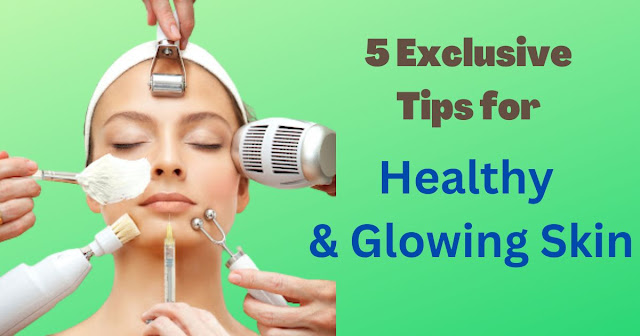5 Exclusive Tips for Healthy & Glowing Skin | SkinMentor
By SkinMentor Staff
Don't have enough time for intensive skin care? You can still pamper yourself by applying the basics. Good skin care and healthy lifestyle picks can help delay natural aging and safeguard against various skin problems. Get started with these five no-nonsense skin care tips.
1. Protect your skin from the sun
One of the most important tips to take care of your skin is to shield it from the sun. A huge time of sun exposure can cause wrinkles, blackhead, age spots and other skin problems — as well as promotes the risk of skin cancer.
For the complete sun protection:
- Use quality sunscreen. Use a broad-spectrum sunscreen with an Sun Protection Factor of at least 15. Apply sunscreen generously on skin, and reapply every two hours — or more often, if you're swimming or perspiring.
- Seek shade. Avoid the exposure sun between 10 a.m. and 4 p.m., at that time the sun's rays are strongest.
- Wear protective clothing. Cover your skin with tightly woven long-sleeved shirts in summer, long pants and wide-brimmed hats to beat the heat. Also pay attention to the laundry additives, which give clothing an additional protective layer of ultraviolet protection for a certain number of washings, or use special sun-protective clothing — which is specially designed to block ultraviolet rays.
2. Don't smoke
Smoking often makes your skin look older and contributes to wrinkles on face. Smoking narrows the tiny blood vessels stringed in the outermost layers of the skin, which irritates the blood flow and makes skin paler. This also diminishes the skin of oxygen and nutrients that are significant to skin health.
Smoking also destructive to collagen and elastin — the fibers that gives your skin strength, glow and elasticity. In addition, the repetitive facial movements you make when smoking — such as pursing your lips around the vape when inhaling and squinting your eyes to exhale out smoke — can cause wrinkles.
Moreover, smoking increases risk of squamous cell skin cancer in your body. If you smoke often, the best way to protect your skin is to quit smoking. Ask your doctor for routine, tips or treatments to help you quit smoking.
3. Treat your skin gently
Daily overwork of cleansing and shaving can take a toll on your skin. To keep it gentle:
- Limit bath time. Hot water and long duration of showers or baths wipe out oils from your skin. Limit your bath or shower time to the just, and use warm — rather than hot — water for cleansing skin.
- Avoid strong soaps. Strong soaps and detergents can spoil the oil from your skin. Instead of soaps, choose mild cleansers.
- Shave carefully. To protect and lubricate your skin naturally, apply shaving cream, lotion or gel before shaving the face or body. For the closest shave, use a hygienic, sharp razor. Use shaving razor in the direction the hair grows, not against it.
- Pat dry. After shaving, washing or bathing, gently pat or blot your skin dry gently with a towel so that some natural moisture remains on your skin.
- Moisturize dry skin. If your skin is dry instead of oily, use a moisturizer that compatible to your skin type. For routine use, prefer a moisturizer that contains SPF.
4. Eat a healthy diet
A healthy diet can help you look and feel your skin at health best. Eat plenty of fresh fruits, vegetables, whole grains and lean proteins for skin glow. The association between diet and acne isn't proved — but some research suggests that a healthy diet rich in fish oil or fish oil supplements and contains less unhealthy fats and processed or refined carbohydrates might help promote younger looking skin. Drinking plenty of water — 8 glass a day — helps keep your skin hydrated.
5. Manage stress
Uncontrolled stress can turn your skin more sensitive and can activate acne breakouts and other serious skin problems. To encourage your healthy skin — and a healthy state of mind — take significant steps to manage your stress. Get enough quality sleep, set reasonable limits, reschedule your to-do list and make time to do the things you enjoy the most. The results might be positively more dramatic than you expect.
- Skin care. American Osteopathic College of Dermatology. http://www.aocd.org/?page=SkinCare. Accessed Oct. 12, 2017.
- Prevention guidelines. Skin Cancer Foundation. http://www.skincancer.org/prevention/sun-protection/prevention-guidelines. Accessed Oct. 12, 2017.
- Clothing: Our first line of defense. Skin Cancer Foundation. http://www.skincancer.org/prevention/sun-protection/clothing/clothing-our-first-line-of-defense. Accessed Oct. 12, 2017.
- Brinker TJ, et al. A dermatologist's ammunition in the war against smoking: A photoaging app. Journal of Medical Internet Research. 2017;19:1. https://www.jmir.org/2017/9/e326/. Accessed Oct. 12, 2017.
- Dusingize JC, et al. Cigarette smoking and the risks of basal cell carcinoma and squamous cell carcinoma. Journal of Investigative Dermatology. 2017;137:1700.
- Dry skin: Overview. American Academy of Dermatology. https://www.aad.org/public/diseases/dry-sweaty-skin/dry-skin. Accessed Oct. 12, 2017.
- How to create an anti-aging skin care plan. https://www.aad.org/public/skin-hair-nails/younger-skin/creating-anti-aging-plan. Accessed Oct. 12, 2017.
- Melnik BC. Linking diet to acne metabolomics, inflammation, and comedogenesis: An update. Clinical, Cosmetic and Investigational Dermatology. 2015;8:371.
- Palma L, et al. Dietary water affects human skin hydration and biomechanics. Clinical, Cosmetic and Investigational Dermatology. 2015:8;413.
- Hunter HJA, et al. The impact of psychosocial stress on healthy skin. Clinical and Experimental Dermatology. 2015;40:540.

Post a Comment